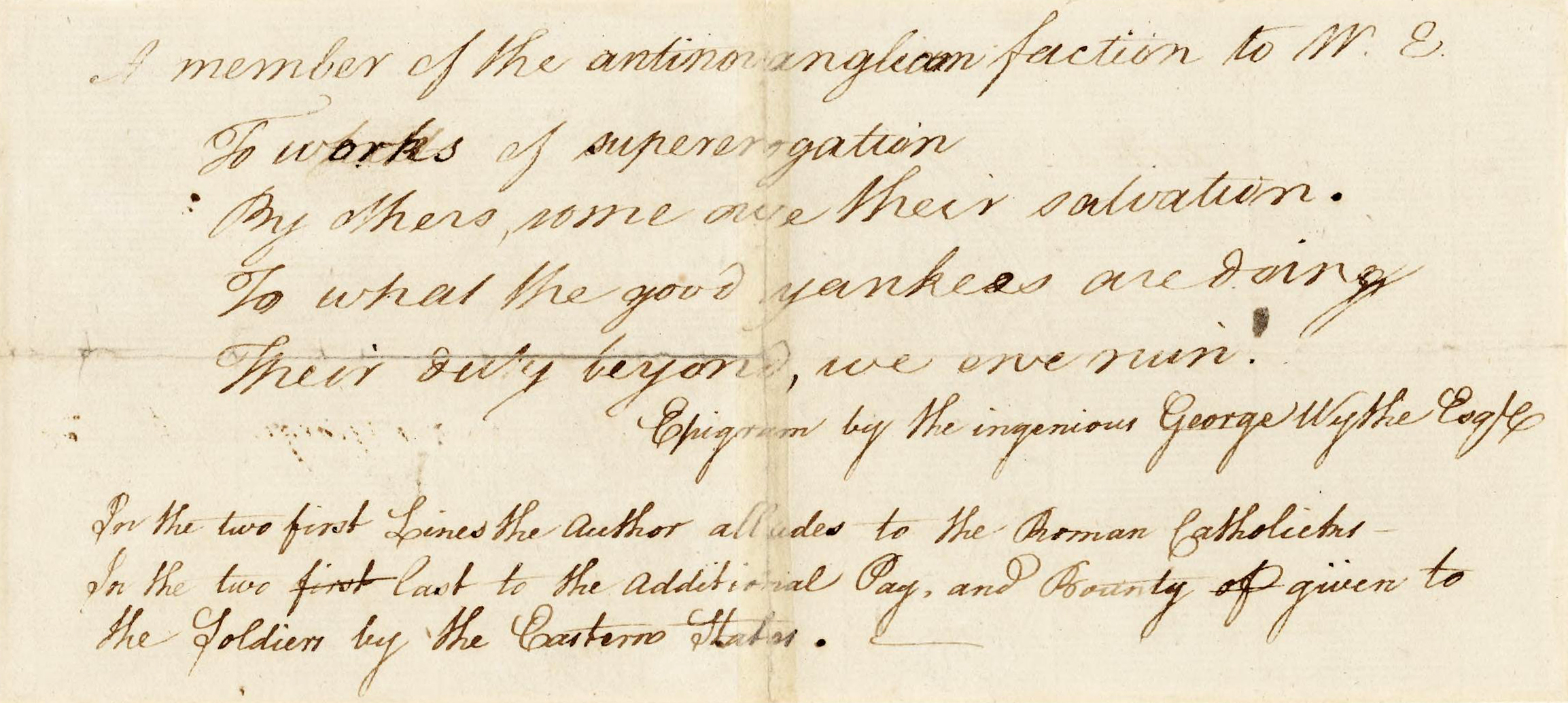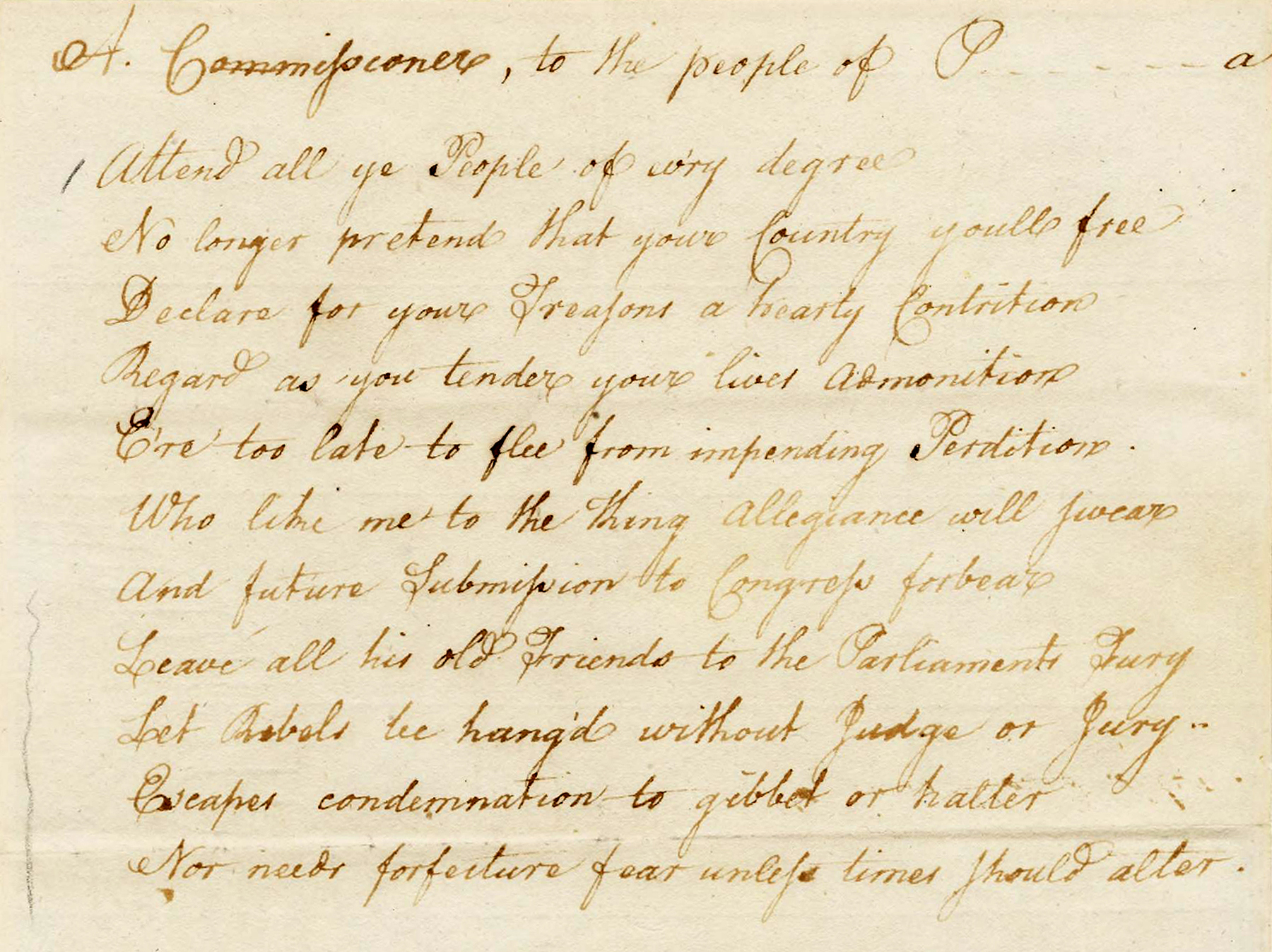Difference between revisions of "Poems on Witty Subjects in Congress"
(→"Answer to Epigram," by George Wythe) |
|||
| Line 34: | Line 34: | ||
<center>A Novanglian to G. W.</center> | <center>A Novanglian to G. W.</center> | ||
As by works supererogatory<br /> | As by works supererogatory<br /> | ||
| − | Rom | + | Rom. Caths are saved from purgatory,<br /> |
So by what the Yankees good are doing<br /> | So by what the Yankees good are doing<br /> | ||
Buckskins will save from utter ruin. | Buckskins will save from utter ruin. | ||
| Line 117: | Line 117: | ||
|} | |} | ||
| − | === | + | ===With One Epigram, Though Well Hit Off" by George Wythe=== |
| − | |||
| − | |||
| − | |||
| − | |||
| − | |||
| − | |||
| − | |||
| − | |||
| − | |||
| − | |||
| − | |||
| − | |||
| − | |||
| − | |||
| − | |||
| − | |||
| − | |||
| − | |||
| − | |||
{| style="margin-bottom: 20px;" | {| style="margin-bottom: 20px;" | ||
| Line 277: | Line 258: | ||
| | | | ||
[[File:PoemsOnWittySubjectsInCongressP25.jpg|thumb|600px|Page twenty-five from [https://archive.org/details/poemsonwittysubj00elle ''Poems on Witty Subjects in Congress,''] from the [https://www.bpl.org/ Boston Public Library's] [https://archive.org/details/bplscarwm American Revolutionary War Manuscripts Collection.]]] | [[File:PoemsOnWittySubjectsInCongressP25.jpg|thumb|600px|Page twenty-five from [https://archive.org/details/poemsonwittysubj00elle ''Poems on Witty Subjects in Congress,''] from the [https://www.bpl.org/ Boston Public Library's] [https://archive.org/details/bplscarwm American Revolutionary War Manuscripts Collection.]]] | ||
| + | |} | ||
| + | |||
| + | ===Copy of Ellery's epigram, in Wythe's hand=== | ||
| + | |||
| + | {| style="margin-bottom: 20px;" | ||
| + | |- style="vertical-align: top;" | ||
| + | | | ||
| + | {| | ||
| + | | style="width: 500px; white-space: nowrap; margin: 20px 0 20px 20px; background-color: #f9f7e0; border: 1px solid #000000; padding: 20px 50px;" | | ||
| + | Like a Babbler ambitious of some little fame<br /> | ||
| + | I follow when Freeman hath started the Game,<br /> | ||
| + | But when hunted down poor Puss sinks and dies<br /> | ||
| + | I give up to Freeman his Right to the Prize<br /> | ||
| + | Let Wythe take the Laurel his Genius demands<br /> | ||
| + | I ask but this Book to be classed with his Friends. | ||
| + | <center>W. E.</center> | ||
| + | |} | ||
| + | | | ||
| + | [[File:PoemsOnWittySubjectsInCongressP11.jpg|thumb|600px|Page eleven from [https://archive.org/details/poemsonwittysubj00elle ''Poems on Witty Subjects in Congress,''] from the [https://www.bpl.org/ Boston Public Library's] [https://archive.org/details/bplscarwm American Revolutionary War Manuscripts Collection.]]] | ||
|} | |} | ||
Revision as of 10:07, 16 April 2014
George Wythe and Willam Ellery, "Poems on Witty Subjects in Congress," American Revolutionary War Manuscripts Collection, Boston Public Library, MS.Ch.E.8.31-33.[1]
Contents
- 1 Manuscript text, November-December 1776
- 1.1 "A Member of the Antinovanglian Faction to W. E.," by George Wythe (VA)
- 1.2 "A Novanglican to G.W.," by William Ellery (RI)
- 1.3 "Instead of Controlling Our Mary's Cross Humor," by William Ellery
- 1.4 "For Farms in Utopia, the Moon, or Some Fairyland," by George Wythe
- 1.5 With One Epigram, Though Well Hit Off" by George Wythe
- 1.6 "Unless You Will Take One Line for Your Ten," by William Ellery
- 1.7 "You've Not only Quitted Your Arrear," by George Wythe
- 1.8 "Some Mere Poetaster Call Tully," by George Wythe
- 1.9 "The Gen'rous Idea Your Last Piece Expresses," by William Ellery
- 1.10 Copy of Ellery's epigram, in Wythe's hand
- 1.11 "A Commissioner, to the People of Philadelphia," by William Ellery
- 2 See also
- 3 References
- 4 External links
Manuscript text, November-December 1776
"A Member of the Antinovanglian Faction to W. E.," by George Wythe (VA)
|
"A Novanglican to G.W.," by William Ellery (RI)
|
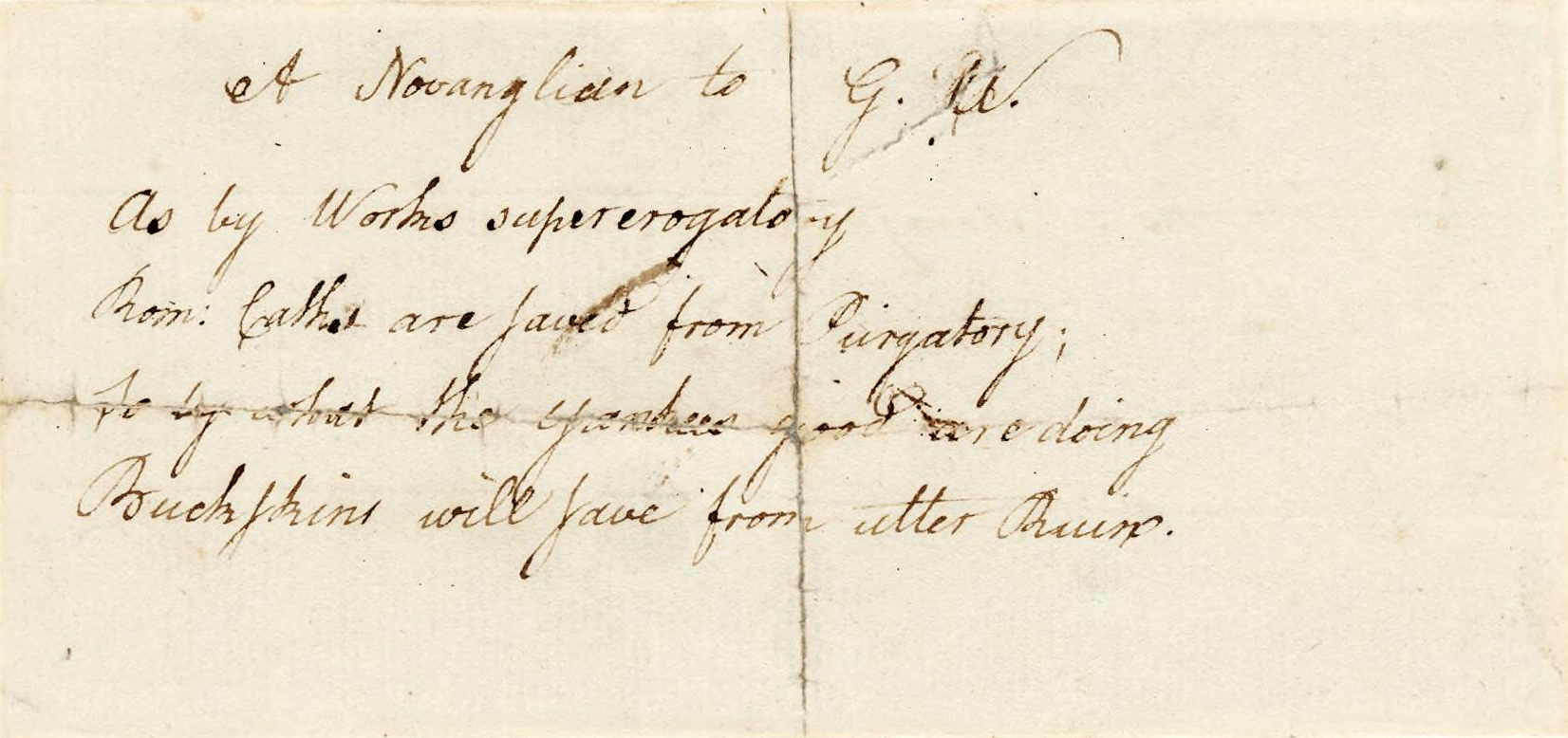 Page three from Poems on Witty Subjects in Congress, from the Boston Public Library's American Revolutionary War Manuscripts collection. |
"Instead of Controlling Our Mary's Cross Humor," by William Ellery
|
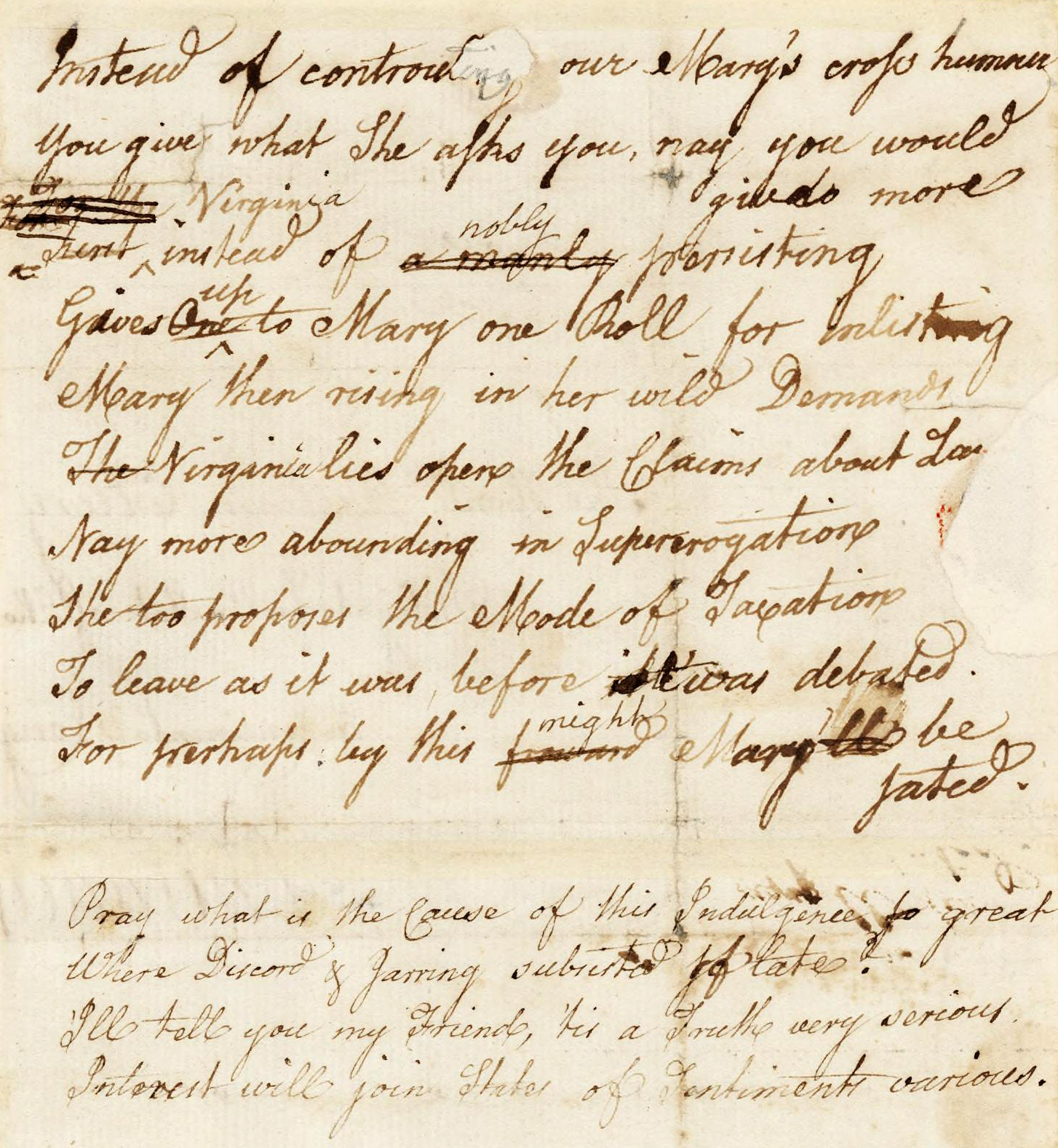 Page five from Poems on Witty Subjects in Congress, from the Boston Public Library's American Revolutionary War Manuscripts Collection. |
"For Farms in Utopia, the Moon, or Some Fairyland," by George Wythe
|
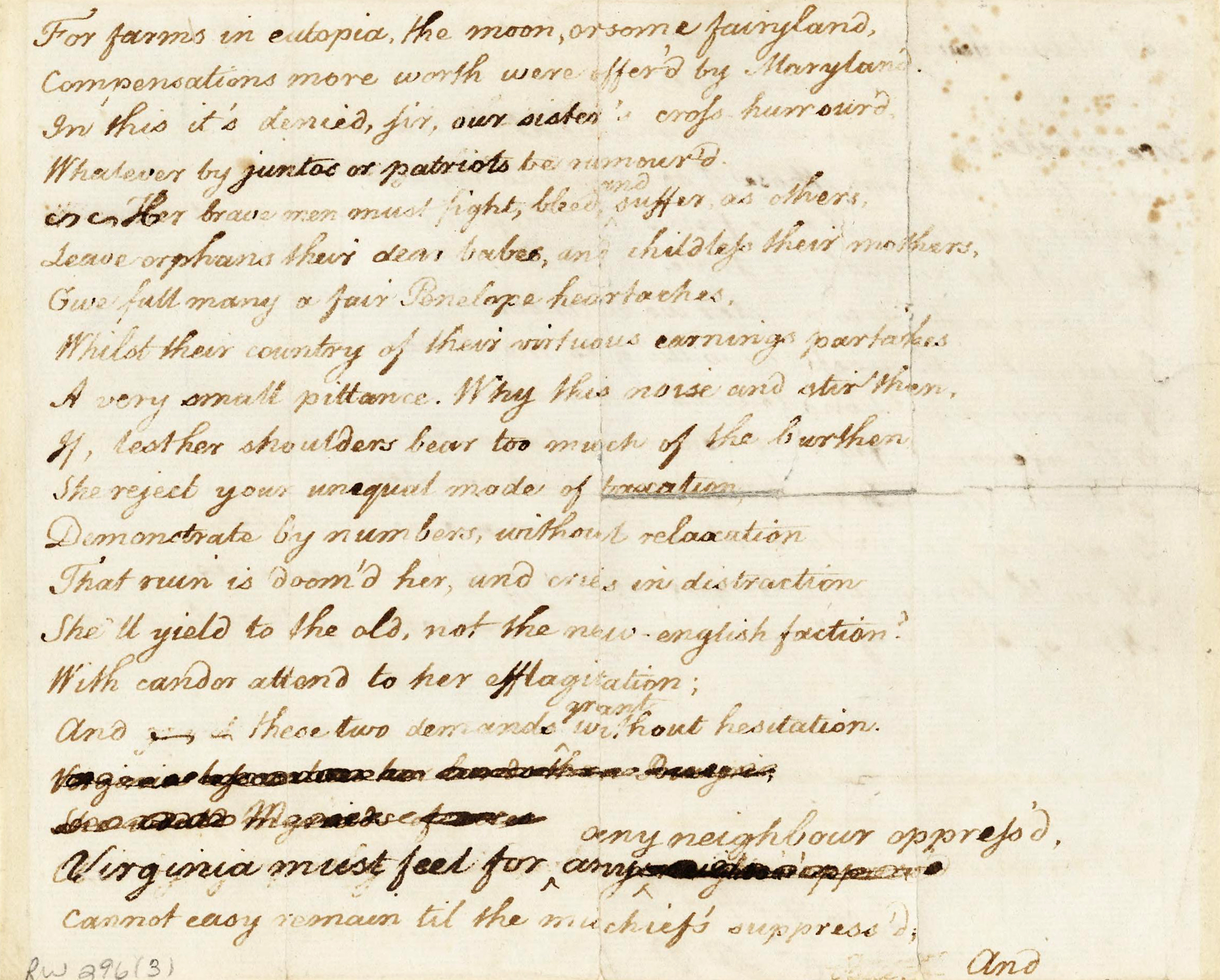 Page nine from Poems on Witty Subjects in Congress, from the Boston Public Library's American Revolutionary War Manuscripts Collection. | |
|
And if slaves you include in your capitation, |
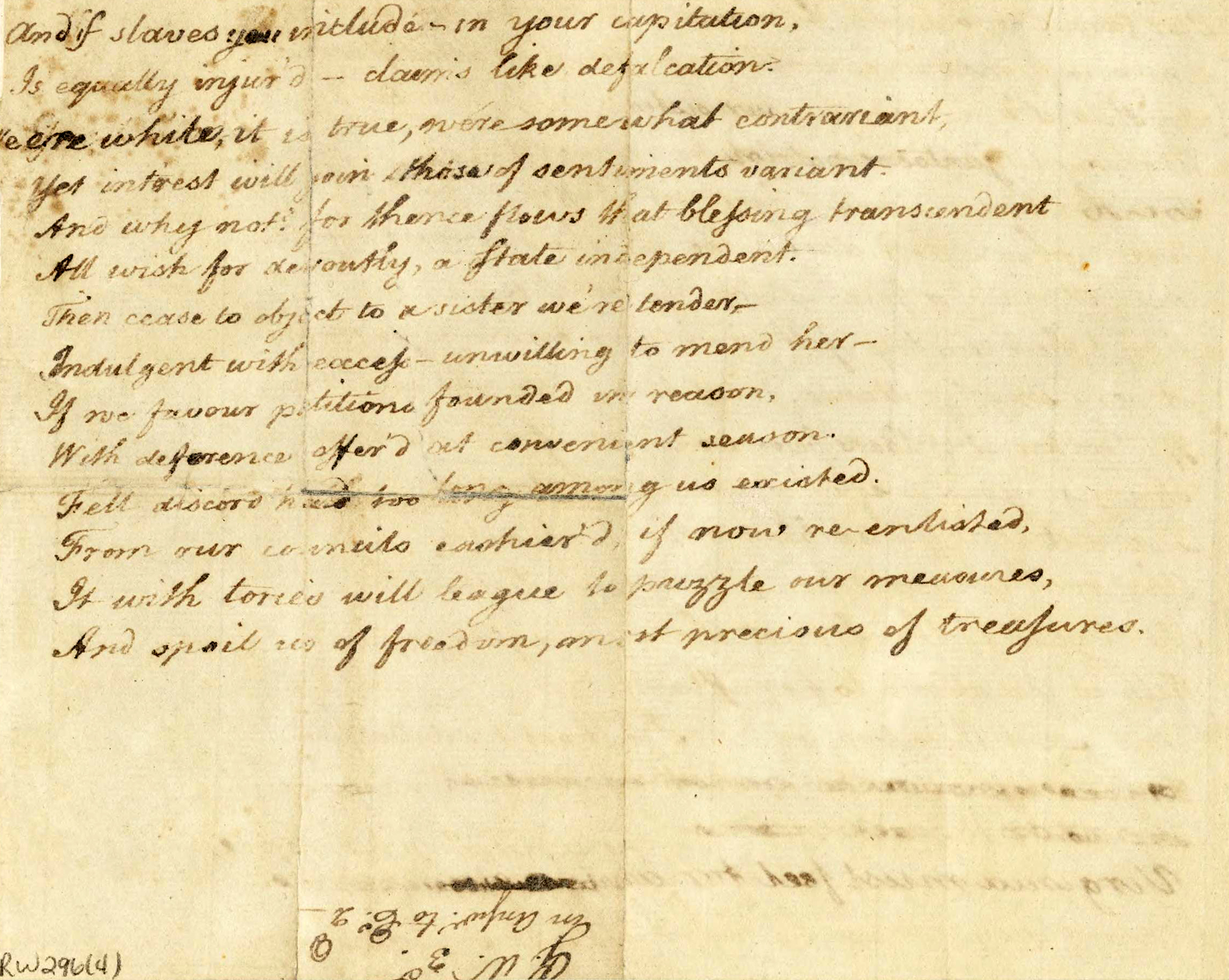 Page ten from Poems on Witty Subjects in Congress, from the Boston Public Library's American Revolutionary War Manuscripts Collection. |
With One Epigram, Though Well Hit Off" by George Wythe
|
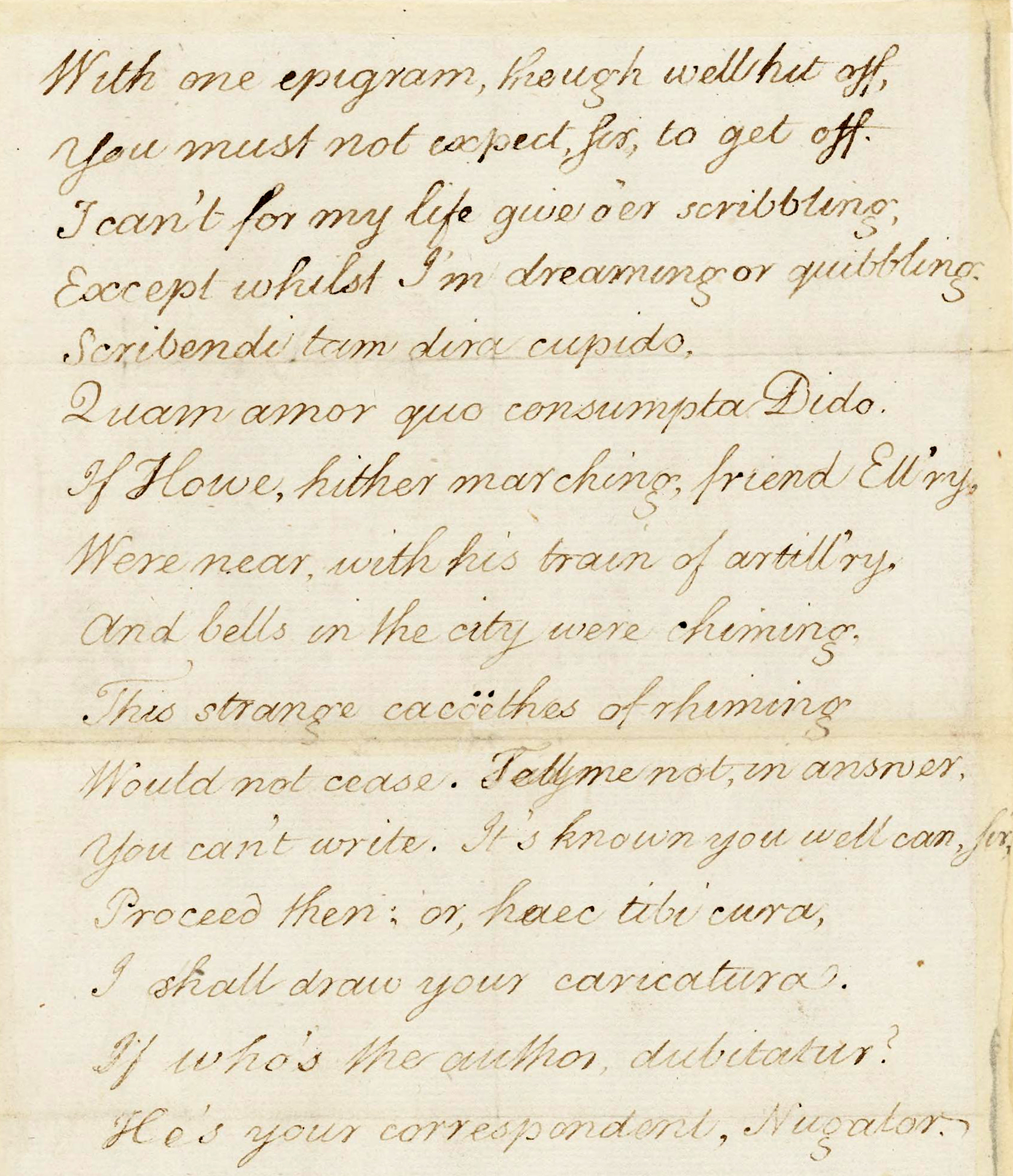 Page twenty-one from Poems on Witty Subjects in Congress, from the Boston Public Library's American Revolutionary War Manuscripts Collection. |
"Unless You Will Take One Line for Your Ten," by William Ellery
|
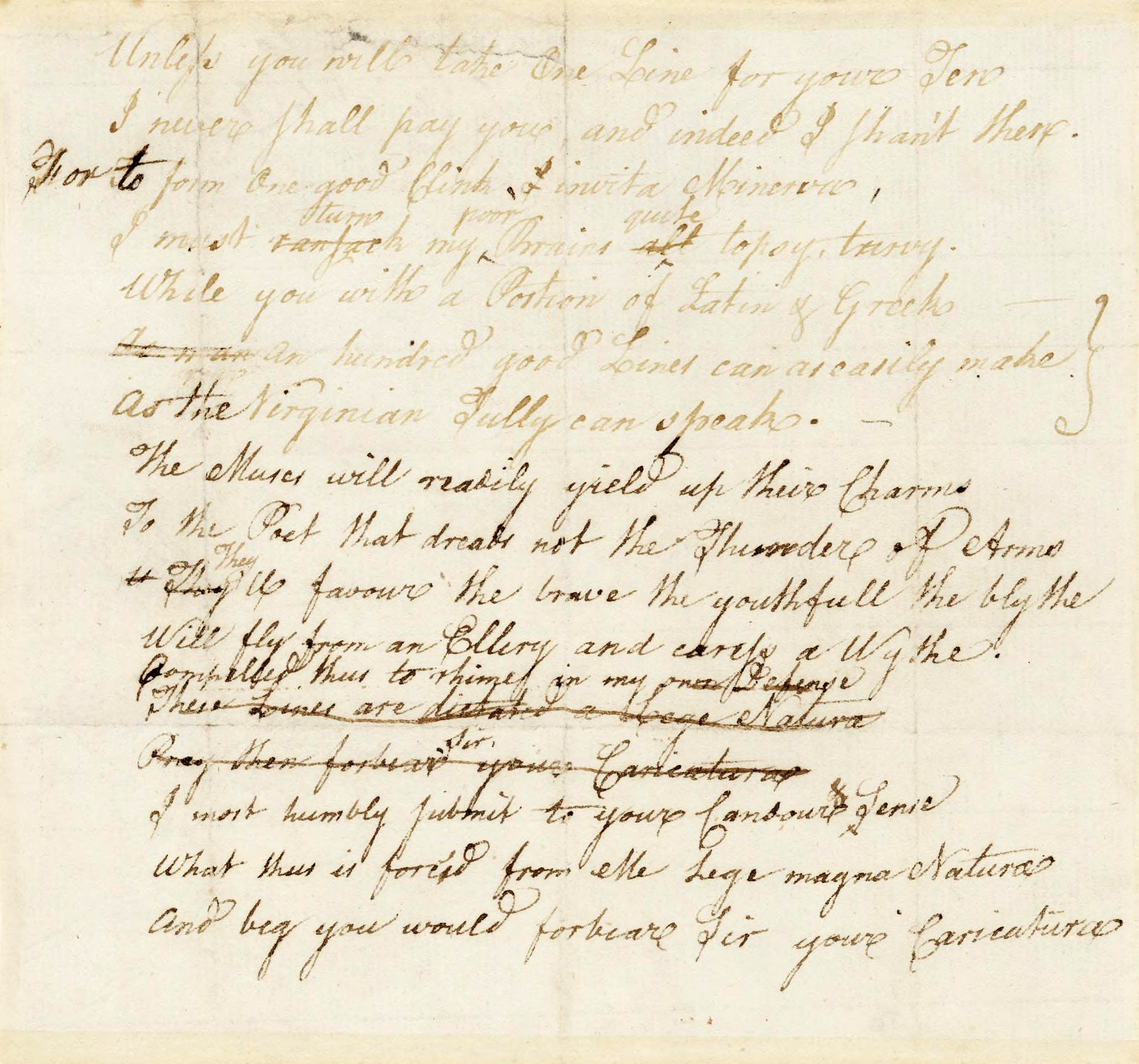 Page twenty-three from Poems on Witty Subjects in Congress, from the Boston Public Library's American Revolutionary War Manuscripts Collection. |
"You've Not only Quitted Your Arrear," by George Wythe
|
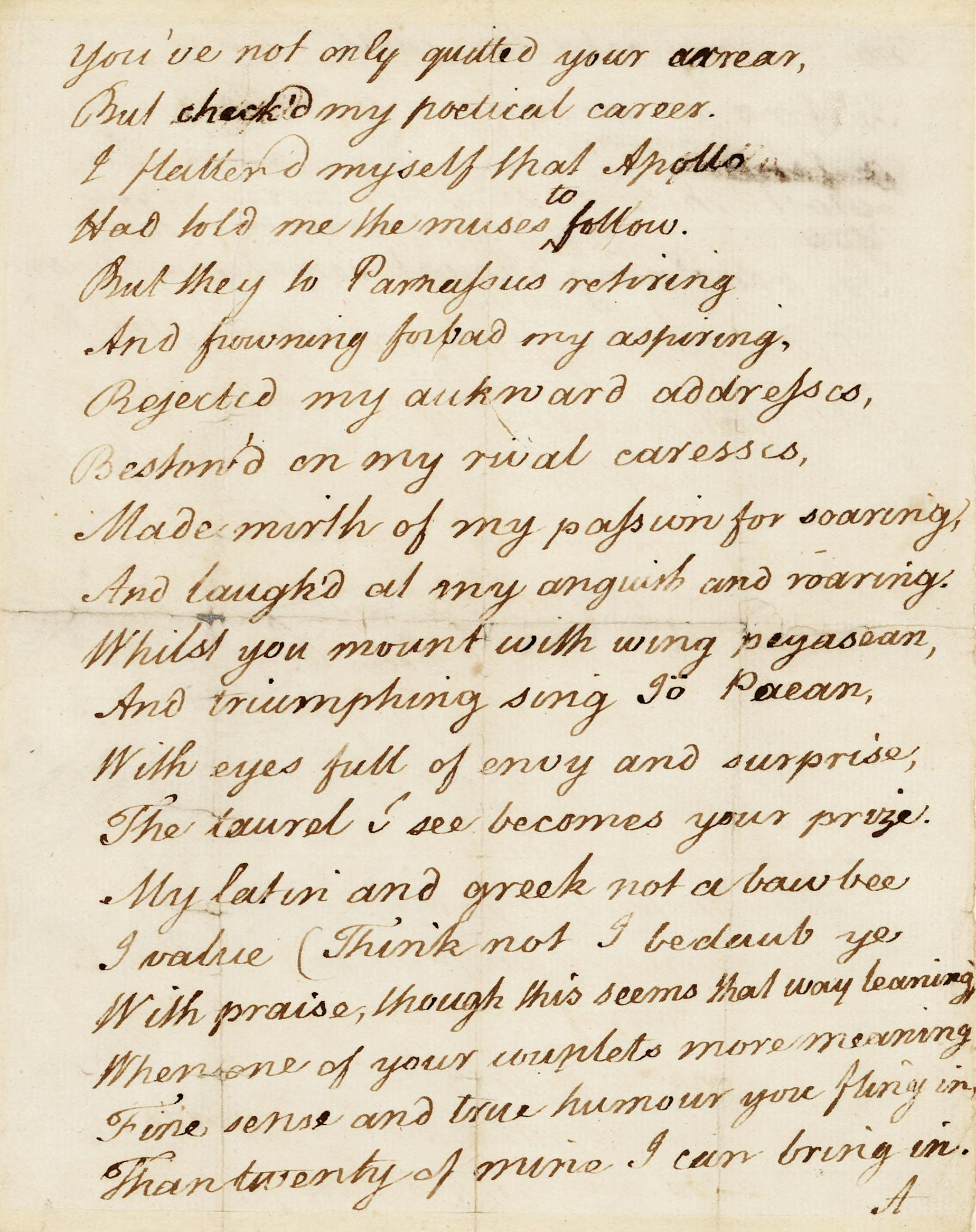 Page fifteen from Poems on Witty Subjects in Congress, from the Boston Public Library's American Revolutionary War Manuscripts Collection. |
"Some Mere Poetaster Call Tully," by George Wythe
|
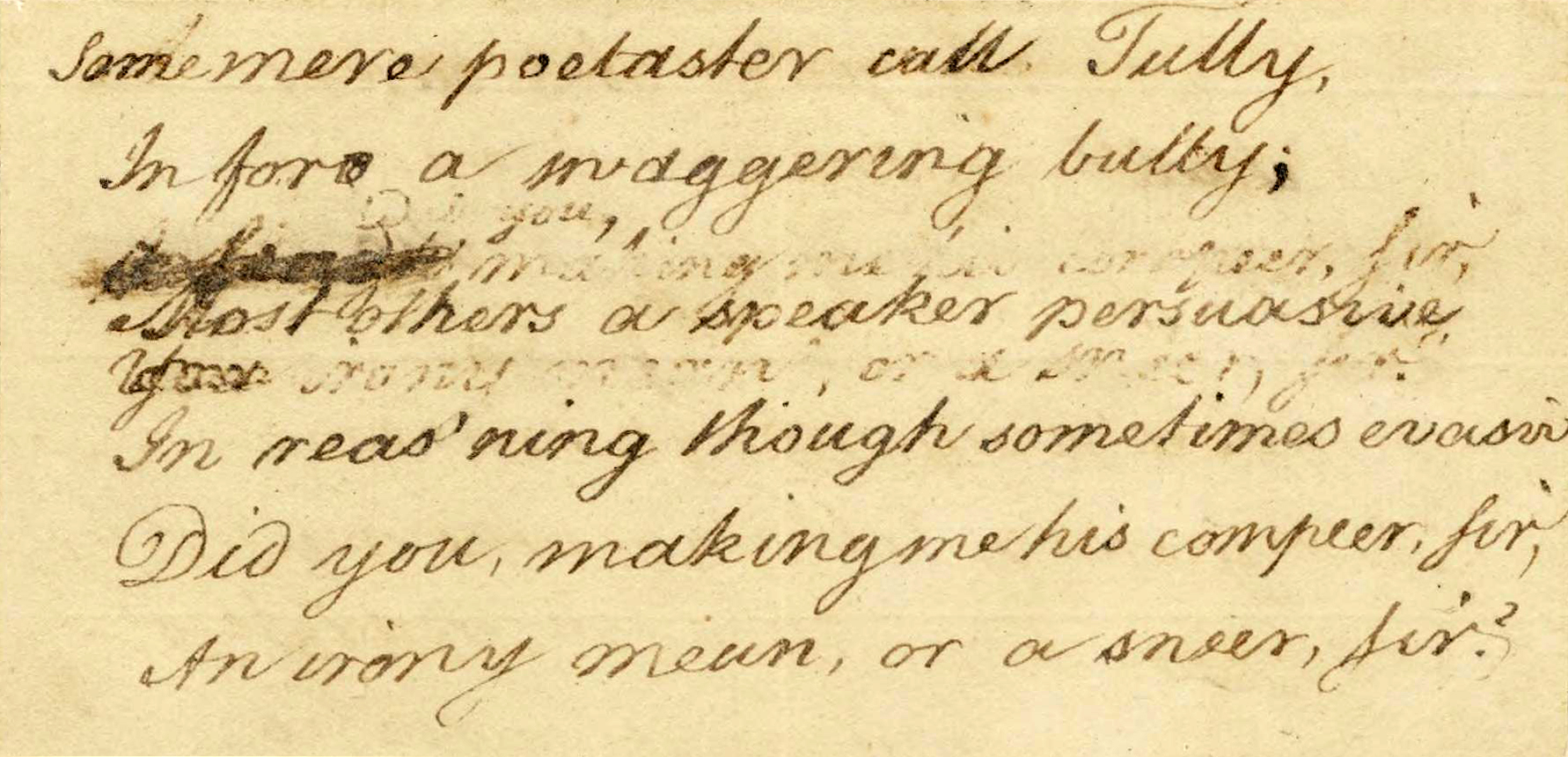 Page sixteen from Poems on Witty Subjects in Congress, from the Boston Public Library's American Revolutionary War Manuscripts Collection. |
"The Gen'rous Idea Your Last Piece Expresses," by William Ellery
|
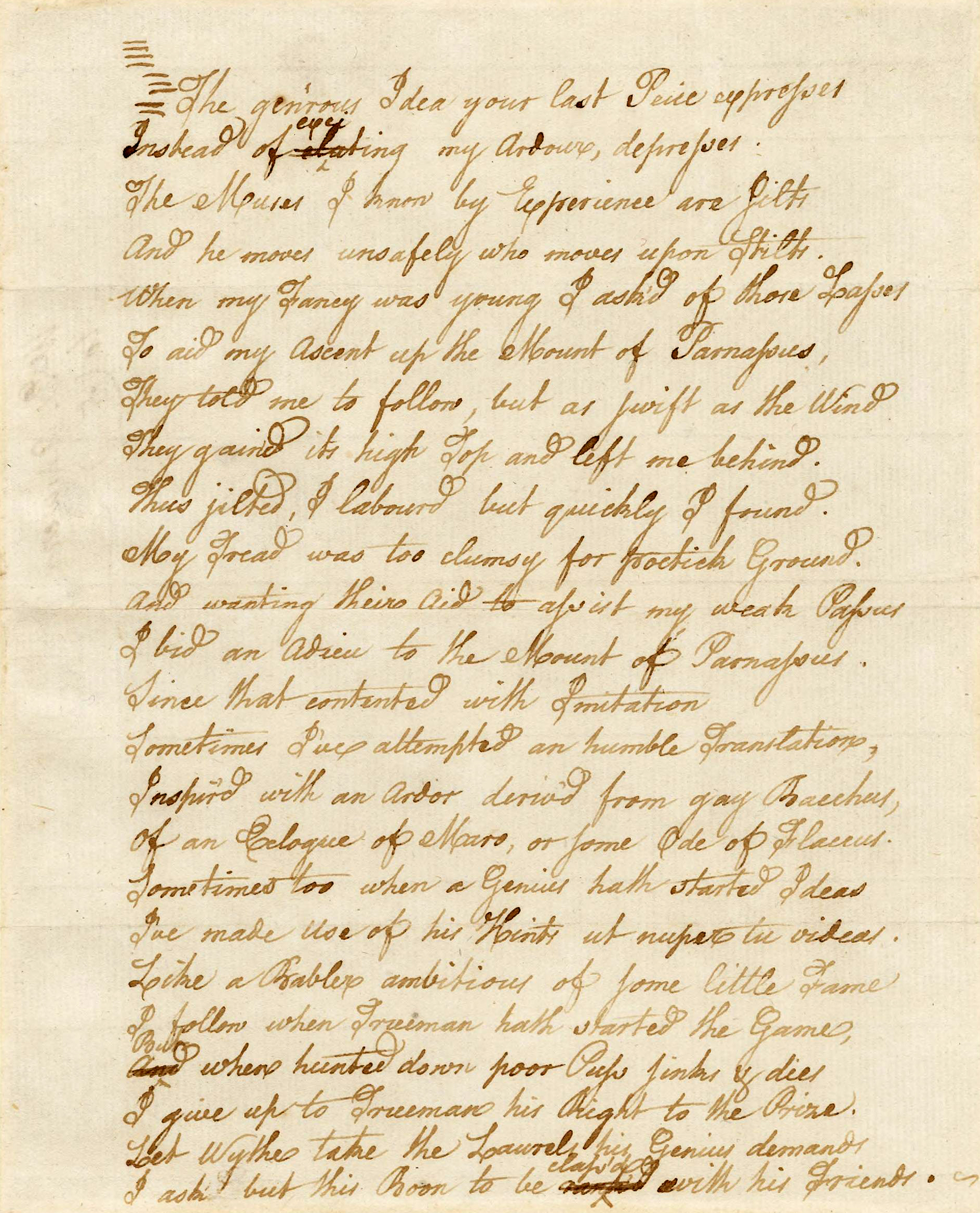 Page twenty-five from Poems on Witty Subjects in Congress, from the Boston Public Library's American Revolutionary War Manuscripts Collection. |
Copy of Ellery's epigram, in Wythe's hand
|
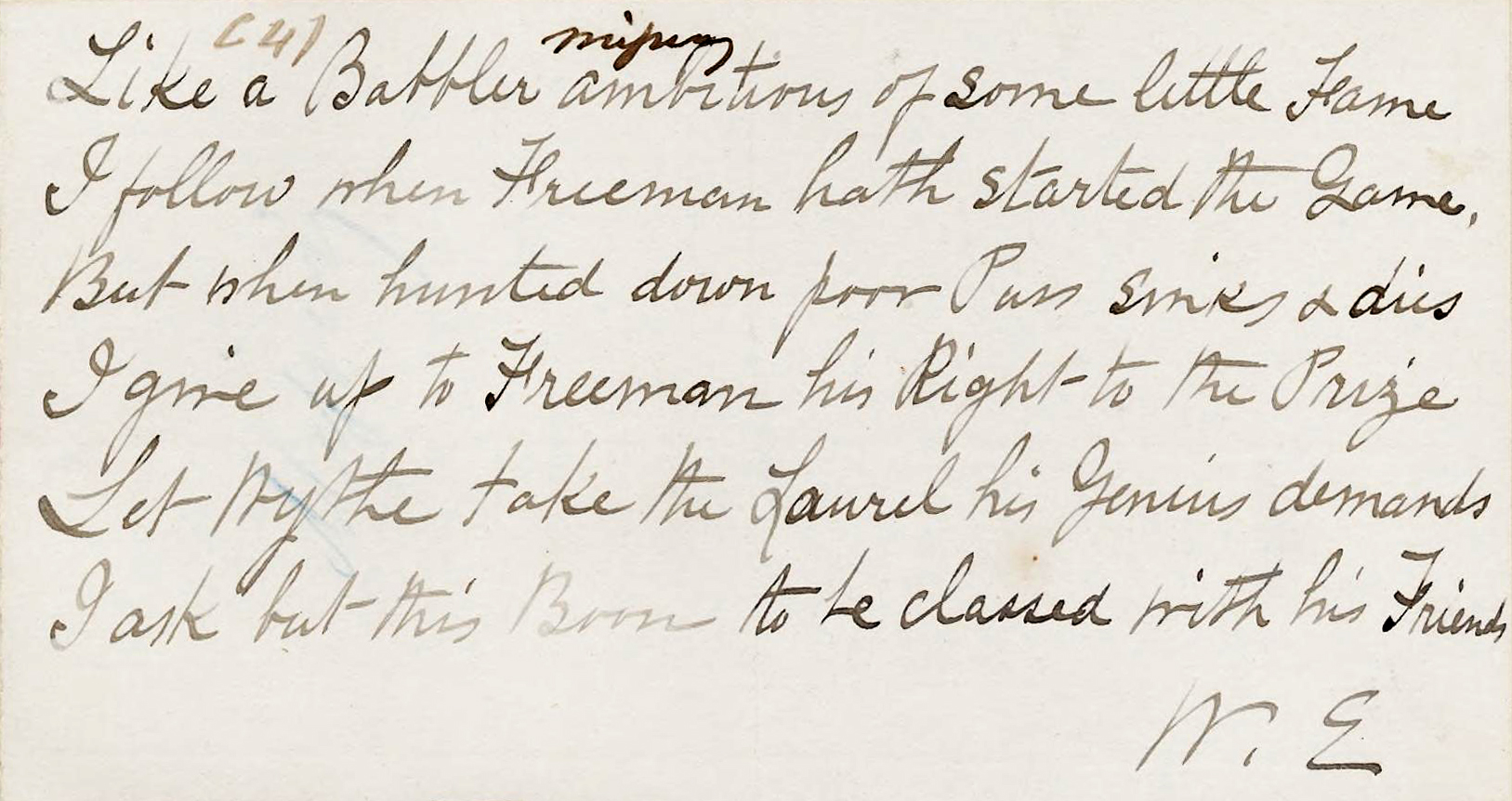 Page eleven from Poems on Witty Subjects in Congress, from the Boston Public Library's American Revolutionary War Manuscripts Collection. |
"A Commissioner, to the People of Philadelphia," by William Ellery
In this poem, Ellery chastises the conservative position of Andrew Allen, delegate from Pennsylvania, for his commonwealth's reluctance to support independence from Great Britain. The first letter of each line spells out "ANDREW ALLEN" (emphasized here). Ellery apparently attempted to get the poem published, as there is another draft with the lines transposed to avoid obvious "libellus famosos" (libel), and a dialogue with a reluctant printer:
|
|
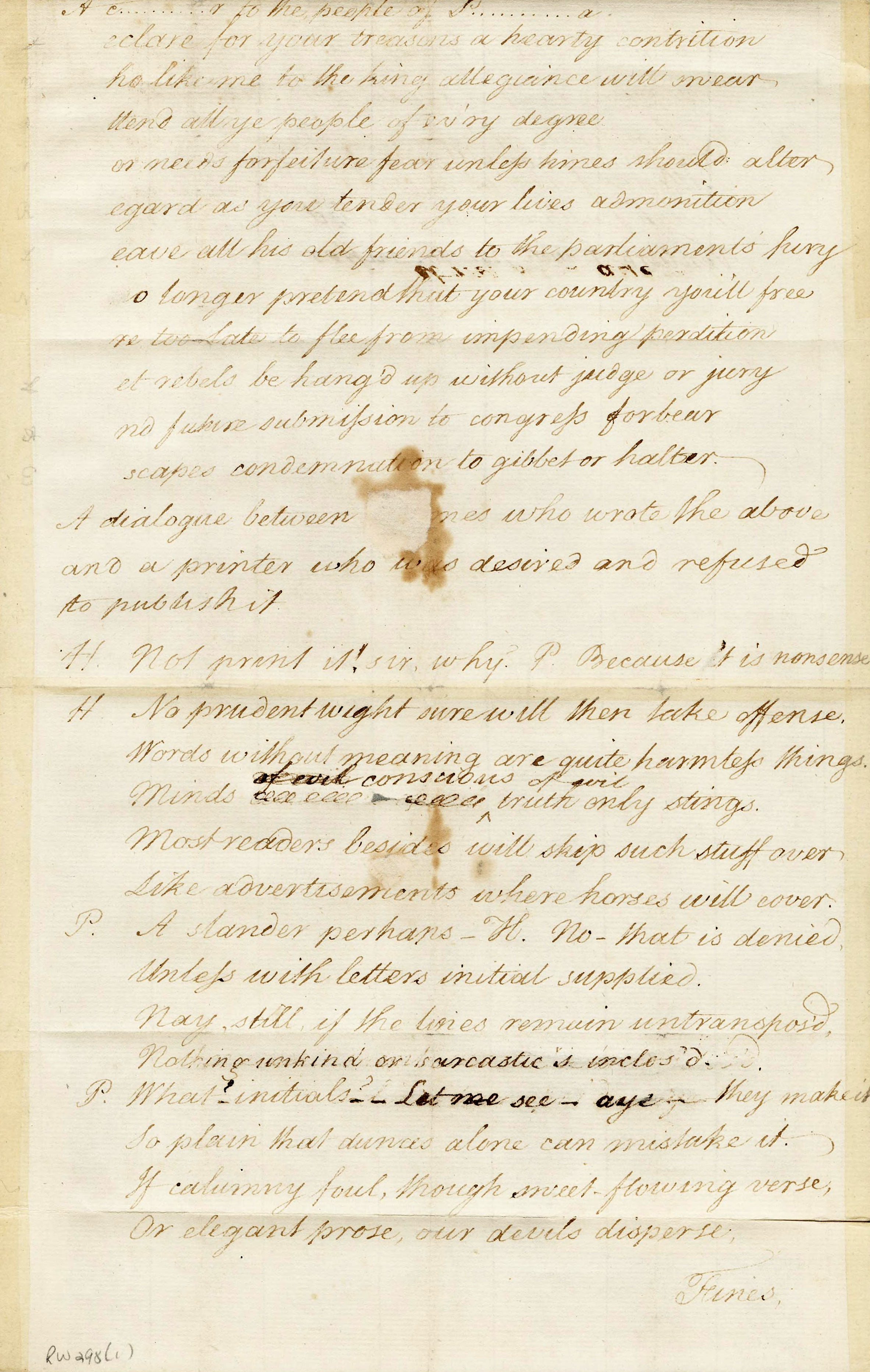 Page nineteen from Poems on Witty Subjects in Congress, from the Boston Public Library's American Revolutionary War Manuscripts Collection. | |
|
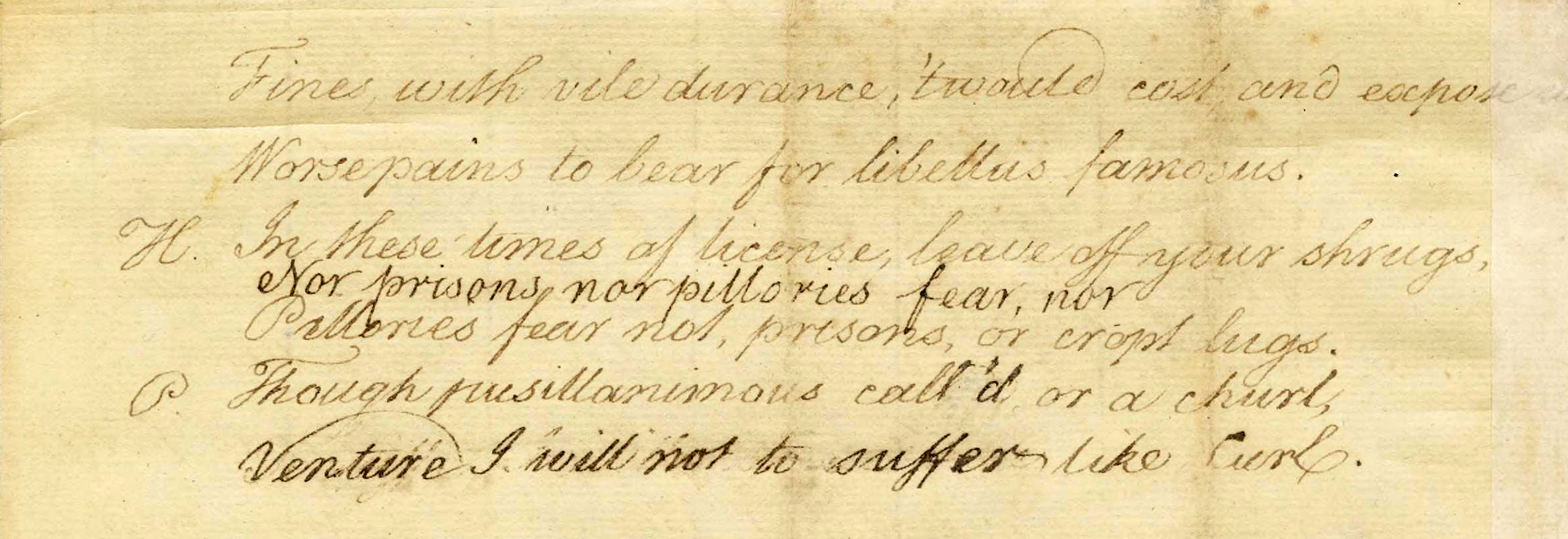 Page twenty from Poems on Witty Subjects in Congress, from the Boston Public Library's American Revolutionary War Manuscripts Collection. |
See also
References
- ↑ See W. Edwin Hemphill, "George Wythe Courts the Muses," William and Mary Quarterly 3rd ser., 9, no. 3 (July 1952), 338-345.
- ↑ "Novanglian": New Englander.
- ↑ "Dire desire to write," paraphrase of Virgil, Aeneid, Book V, line 721.
- ↑ "The love which consumed Dido," Queen of Carthage.
- ↑ General William Howe, (1729 – 1814), Commander-in-Chief of British forces during the American Revolutionary War, captured Philadelphia in September, 1777.
- ↑ Ovid, Ex Ponto III, xxxvi.
- ↑ Dubitatur: "It is doubted."
- ↑ Jester, clown.
- ↑ Defy nature, literally "go against Minerva's will." Cicero, De Officiis, I, 31, 110.
- ↑ Wythe is a Virginian Cicero: Marcus Tullius Cicero.
- ↑ A great law of Nature.
- ↑ Classical Greek cry of exultation or triumph, traditionally addressed to Apollo the healer.
- ↑ Bawbee: a Scottish half-penny.
- ↑ "As of late, you see."
- ↑ Libellus famosos: libel.
- ↑ A reference to the colonial punishment of cutting off ears?
- ↑ Edmund Curll (c. 1675 – 1747), whose name was synonymous with "unscrupulous publication and publicity."
External links
- Boston Public Library, Special Collections.
- American Revolutionary War Manuscripts at the Boston Public Library, Internet Archive.
- Read these poems in the Internet Archive.
